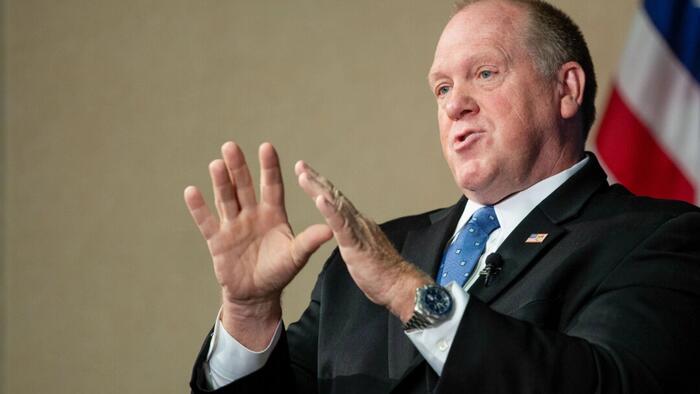The impending immigration policies of the Trump administration are taking shape with the appointment of Tom Homan as the incoming border czar. Homan, who had previously led U.S. Immigration and Customs Enforcement (ICE), estimates that at least 100,000 detention beds will be required to prosecute the mass deportation agenda promised by President-elect Donald Trump. ICE currently has about 38,700 illegal immigrants in detention facilities, with an additional nearly 185,000 individuals monitored through electronic means, costing taxpayers a substantial daily fee for monitoring alone. Homan has emphasized the necessity of enhanced infrastructure and staffing, indicating that new detention facilities will be built, and additional ICE agents will soon be hired. The feasibility of these initiatives, he notes, is contingent upon the funding he secures from Congress, which will be under Republican control as of January 2025.
Homan has indicated a willingness to enlist military assistance, albeit in a non-combative role. He clarifies that military personnel will not directly engage in arrests but will serve as a support system, aiding in non-enforcement tasks that can facilitate the operations of immigration officials. The initial phase of deportations will prioritize illegal immigrants with established criminal histories or those identified as threats to national security. However, the resistance faced from sanctuary cities, where local policies restrict cooperation with ICE, may force agents to resort to neighborhood searches to apprehend these individuals, consequently leading to what Homan refers to as “collateral arrests” of non-target individuals. This operational strategy emphasizes a commitment to aggressive enforcement, with no exemption for families based on the citizenship status of their children.
The administration’s deportation strategy has drawn a mixed response from lawmakers and community groups. Supporters assert that strict deportation policies are essential for restoring law and order, protecting American citizens, and ensuring the enforcement of immigration laws. The Federation for American Immigration Reform, for instance, highlights the necessity of these measures to uphold legal compliance and safeguard communities nationwide. Conversely, critics argue that such aggressive deportation tactics will inflict severe social and emotional upheavals by tearing families apart and destabilizing communities. Lawmakers like Rep. Rashida Tlaib have highlighted the detrimental effects these plans could have on immigrant families and community cohesion, advocating for resistance against what they describe as a harmful and hostile agenda.
Historically, the Trump administration’s record on deportations has been significant, with approximately 1.2 million deportations occurring over its four-year term. This figure starkly contrasts with the much lower deportation rates observed during President Joe Biden’s initial years in office, where deportations plummeted to around 65,000 annually. However, these numbers surged remarkably in fiscal year 2024, recovering to 253,488 deportations. This fluctuation in deportation statistics underscores the political and operational complexities that characterize immigration enforcement, reflecting shifts not only in leadership but also in policy focus and execution.
The prospect of Homan’s appointment and Trump’s mass deportation plans raises critical questions about the impacts on American families, communities, and the broader social fabric. As governmental actions converge on aggressive enforcement, the ramifications for immigrants residing in the United States—especially those with established family ties—could be profound and far-reaching. The strategies being employed suggest a relentless commitment to uphold immigration laws, disregarding the potential human costs involved in such operations. As this policy direction unfolds, the anticipated engagement from various stakeholders—including lawmakers, community organizations, and advocacy groups—will play a crucial role in shaping the discourse around immigration reform and community resilience.
In conclusion, the Trump administration’s push for mass deportation, spearheaded by Tom Homan, promises a robust and systematic approach to immigration enforcement, which is certain to ignite ongoing debates regarding the effectiveness, morality, and societal impact of such measures. The contention surrounding this issue reflects deeper ideological divides within American society concerning immigration policy, public safety, and human rights. As developments continue, the unfolding narrative will be characterized by both opposition and support—an essential dialogue in navigating the complexities of immigration within the context of American law and social responsibility.

